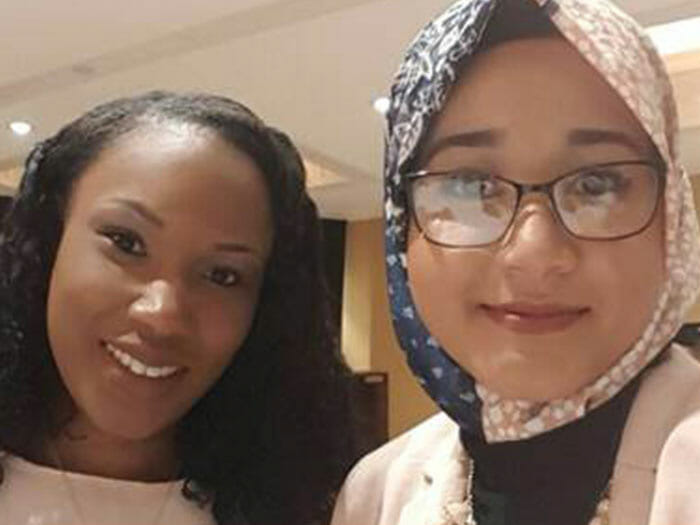Three College of Staten Island (CSI) students and one alumna claimed impressive wins in the New York State Education Department’s (NYSED) 25th Annual Statewide Collegiate Science and Technology Entry Program (CSTEP) Student Science Competition. Jemima Kadima ’16, Monique Johnson ’18, Saleh Smadi ’17, and Norhan Sobhi ’17, all participants of the NYSED CSTEP program, were winners in oral and poster presentations.
The CSTEP competition attracts students from all over the state who compete in various categories relating to science and technology. CSI students took home three awards.
Debra Evans, Project Director for CSTEP, commented, “Our CSTEP students are truly amazing; watching their transformation from challenging their fears to witnessing the various levels of growth, is a reward in itself, and I am honored to have a part of their development.”
The students are mentored by Department of Biology Professors Abdeslem El Idrissi, PhD; Alejandra Alonso, PhD; and Nancy Liu-Sullivan.
Sobhi, a Verrazano School student, and Johnson, a Macaulay Honors College student, both placed first in the field of medicine in the oral research competition. Their project, “Exploring GBM-Targeting Drug Synergism Using 3D Cell Culture Model System,” took a look at Glioblastoma Multiforme (GBM), which is a form of brain cancer that has no known cure and a high mortality rate. They suspected that the signaling pathways that allowed the growth of GBM were the cause of the aggressiveness. Guided by Dr. Sullivan, their research aimed to try to block these signals using “a 3D cell structure system.” They also used two different methods and plan on reporting their findings on tumor growth and signal disruption soon.
Sobhi and Johnson are Medical Technology majors and Dean’s List students. Their findings will potentially help find possible solutions to manage GBM and decrease its high mortality rate.
Smadi placed second in the poster competition in the Biology 2 category. His project “Gestation Exposure to DBP in the Etiology of Autism” looked at the exposure of dibutyl phthalate (DBP) and its role among genes associated with autism. Preliminary findings suggest that “gestational exposure to low doses of DBP causes neuro behavioral abnormalities” as stated in the CSTEP Conference Journal. This abnormality causes a domino effect where the gestation inhibitors malfunction and the result is a developmental delay. Under the supervision of Dr. El Idrissi, Smadi hopes to link these findings from their laboratory test on mice to humans.
Kadima also placed second in the poster competition, but this time in the Biology 1 category. Her project was titled “Investigation of the behavioral effects of Alzheimer-like pseudophosrylated TAU in young mice.” Supervised by Dr. Alonso, the research was aimed at connecting the reaction between two genes to TAU phosphorylation. These genes affect how severe or early Alzheimer’s can begin to. Currently, there have been no distinct differences between the genes. According to Kadima’s report in the CSTEP Conference Journal, her research can help “lead to new treatments, which will aim to prevent or reduce the chances of an individual developing Alzheimer’s disease.”






![[gallery] Third Annual SIBCRI Walkathon draws more than 300 Walker](https://csitoday.com/wp-content/uploads/2013/10/SIBCRI-2013.jpg)













